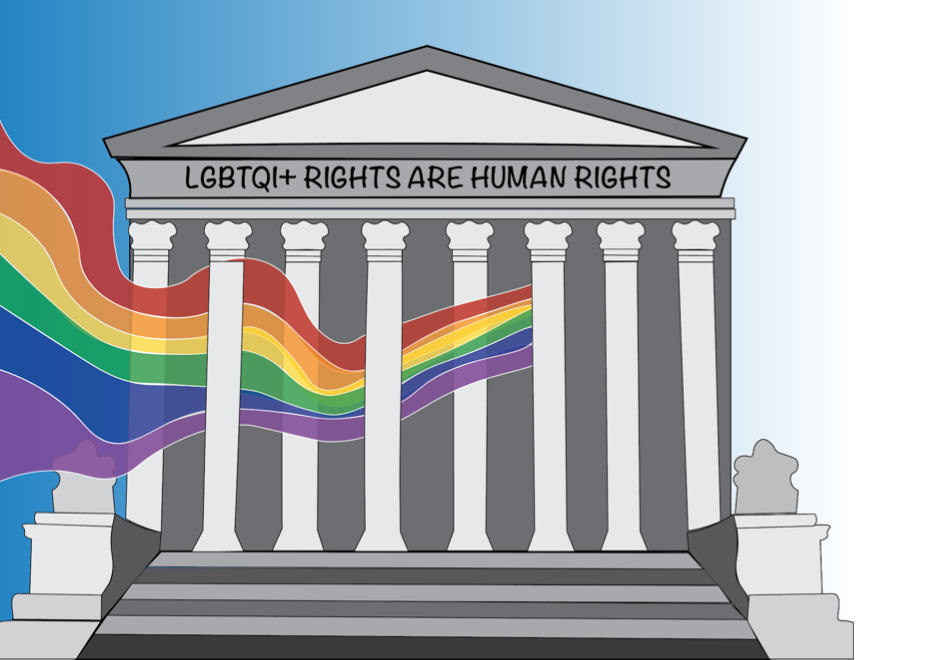
Sarah Knickerbocker
Design Editor
Religious freedom and the rights of the queer community have always had a tumultuous relationship in the United States. Now, with the confirmation of Amy Coney Barrett to the Supreme Court, the tension has built and left the LGBTQI+ community even more uneasy because of her conservative views.
Barrett is a devout Catholic and taught at a school affiliated with the “People of Praise” group which strongly believes that marriage should only be between a man and a woman. While she has a right to religious freedom like anyone else, the fear is that she will bring her conservative, religious beliefs to the courtroom and allow her religious beliefs to influence decisions on individual rights for the LGBTQI+ community. In fact, Pope Francis warned about lay-led groups like People of Praise in 2014 saying that they were “usurping individual freedom” and delegating “important decisions about their lives to others.”
“Love your neighbor doesn’t have exceptions,” said Oliver Hogan ‘22, who was raised in a Roman Catholic family and advocates for the queer community in the church.
Due to the bipartisanship of the government, many citizens feel the need to pick a side with these issues leaving America heavily divided including in the Supreme Court.
“I think that one of the hardest things for those of us in the LGBTQ community is that it doesn’t seem right, fair, or correct that we have to ask people for basic civil rights and liberties. nevertheless, it’s the society we live in,” said professor of political science, Daniel Simmons.
The legacy of Ruth Bader Ginsburg helped pave the way for LGBTQI+ equality in the Supreme Court. But as soon as Ruth Bader Ginsburg died, President Trump and his administration worked quickly to fill her spot to benefit their political views. Despite being determined “qualified” by the New York City Bar, Amy Coney Barrett’s confirmation hearing raised significant concerns such as “maturity of judgment” especially when it came to issues that are considered “politically controversial” according to the NYC Bar. Ten days before the 2020 presidential election, and seven days before RBG’s funeral, Barrett was indeed confirmed.
“She’s going to walk through all of the doors RGB opened for her and close them for everyone else,” said international relations and Spanish major, Micayla O’Connor ’22. Barrett’s confirmation shows how Republicans can be elected for their religious beliefs to promote a political agenda that they will call a religious imperative. Therefore, many students are worried about the rights of the LGBTQI+ community now that the Supreme Court has a 6-3 Republican majority. “It’s fine to be strictly religious, but don’t take your Catholic views and tell me how I should live my life based on your views,” said O’Connor.
Once confirmed, Barrett was automatically put on the ongoing case, Fulton vs. Philadelphia which addresses the tension between religious freedoms and LGBTQ rights. The case concerns a Roman Catholic adoption agency in Philadelphia that claims that it can’t match foster children with same-sex households without violating its religious beliefs.
This is contrary to what Pope Francis, head of the Catholic Church, has said when speaking on the topic. “Homosexuals have a right to be a part of the family,” he said in a documentary released last month. “They’re children of God and have a right to a family. Nobody should be thrown out, or be made miserable because of it.”
“The whole point of an adoption agency is to give those children a loving home,” Hogan said. “People use the Catholic church as an excuse for their own fear and hatred of others.” The addition of Barrett in the Supreme Court may tip the decision scales in favor of the adoption agency which would leave the LGBTQI+ community at risk for discrimination.
“There are real problems with people using religion as a cloak for further discrimination and I think that’s something that rightly should be focused and called out,” Simmons said.
The projected results 2020 presidential election gave many people hope for democracy and for the rights of queer people in the future. But, the fight for LGBTQ+ rights is far from over. “It is soul-crushing to have to justify your own existence in what some people would consider a ‘political dispute.’
“Who we are should never be up for debate,” said political science professor, Michael Bosia. His advice?, “Be aware, and vote as if your life depends on it because somebody’s life does depend on it.”


